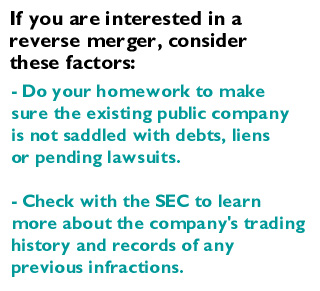|
Tale of a reverse merger
|
 |
October 25, 2000: 12:18 p.m. ET
Such deals allow company to sell shares to public within weeks or months
By Jane Applegate
|
NEW YORK (CNNfn) - The joke about the last person left turning off the lights rang true for Richard Berger when Chicago-based Classics International Entertainment Inc. ceased operating in the mid-1990s.
At its peak in the late 1980s, the company sold millions of dollars worth of pop culture products such as T-shirts, board games and comic books via a network of 22 stores in five states.
"When the bubble burst on Superman, the entire comic book industry went into a tailspin," Berger said. "What was a $1 billion industry tanked at about $200 million in the mid-1990s."
 In 1996, he terminated the remaining 144 workers and stayed on to deal with what was left -- mainly pending lawsuits and unhappy creditors. In 1996, he terminated the remaining 144 workers and stayed on to deal with what was left -- mainly pending lawsuits and unhappy creditors.
"I was the last man -- the sole director and officer when there was nothing left," he recalled. "But I was very concerned about trying to give our 2,700 shareholders something for their investment."
Instead of filing for bankruptcy protection or moving to dissolve the defunct firm, Berger started looking around for an entrepreneurial venture that wanted to go public quickly by merging its operations into the empty public shell of CIEI.
Although securities-industry analysts and mergers and acquisitions experts believe hundreds of small companies go public every year using what's called a "reverse merger," surprisingly, no statistics are kept by the Securities and Exchange Commission.
 "We don't do a lot of statistical analysis at the commission," said a press spokesman for the SEC in Washington, D.C. "Companies do file a disclosure statement about using a shell company when they complete the merger paperwork, but we don't track the numbers." "We don't do a lot of statistical analysis at the commission," said a press spokesman for the SEC in Washington, D.C. "Companies do file a disclosure statement about using a shell company when they complete the merger paperwork, but we don't track the numbers."
In 1998, 1,479 companies filed initial public offerings, according to the SEC. In 1999, the number dropped to 1,085, and the preliminary estimates indicate that figure is expected to remain flat in 2000.
A spokeswoman for the Securities Industries Association, a trade group based in New York City, said her organization doesn't track the number of reverse mergers, either.
Speed is a benefit
Despite the lack of statistics, merging a privately held company in the empty shell of another has certain benefits. The main one is speed -- the merger often allows a company to sell shares to the public within weeks or months, rather than years.
It apparently was a smart move for Piranha Inc., a Dallas-based, high-tech firm that develops digital data compression management products. Piranha merged into CIEI's shell last spring after Berger met Ed Sample through business associates.
Sample, a technology executive at JC Penney (JCP: Research, Estimates), has worked for the $30 billion retailer for 29 years. He was looking for an entrepreneurial venture and was familiar with the problems faced by the printing industry when it came to transmitting large amounts of data online. Data transmission was an issue because JC Penney produced and distributed 65 catalogs a year to 20 million people.
Sample connected with a team of scientists who were developing new ways to compress huge amounts of data. He was convinced they had a marketable technology.
"We had a theory that better ways to compress data would have a big impact on many industries, including video streaming, online entertainment and printing," said Sample, CEO of Piranha Inc.
He and his colleagues wrote a business plan, and by November 1999, they went looking for capital to launch Piranha.
"We validated the market for our technology. When we found it was there, we wanted it to become public immediately," Sample said.
Reviving a dormant company
Sample and Berger decided to merge Piranha Inc. into the shell of CIEI with the help of a securities lawyer and other advisers. The once-prosperous company was dormant, with its stock trading at a half cent per share, but it was still a public company with stock trading on the over-the-counter market "pink sheets."
Although virtually worthless, CIEI had 20 million shares of stock outstanding, 75 broker dealers and 20 market makers still keeping an eye on it. When it resumed trading, Sample, Berger and their management team raised about $10 million from investors.
"Our ticker symbol on the over-the-counter market is BYTE because we are taking a byte out of data," said Sample.
At its peak in March 2000, Piranha stock sold for $65 a share. It's currently trading around $7.50 per share, Berger said.
"We got crushed like everyone else in the technology area," he said. "But we aren't worried about our stock price. We have so many positives, including great management."
Berger said reverse mergers don't often work out as well as this one.
"They don't all work out, but this one is a winner."
(Jane Applegate, a syndicated columnist and author of 201 Great Ideas for Your Small Business, covers small business for CNNfn. "Succeeding in Small Business" appears on CNNfn.com on Wednesdays.) 
|
|
|
|
|
|
SBTV.com
|
Note: Pages will open in a new browser window
External sites are not endorsed by CNNmoney
|
|
|
|
 |

|

